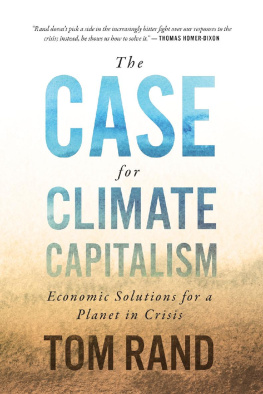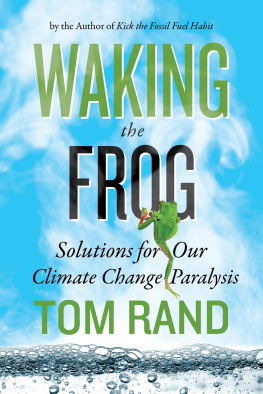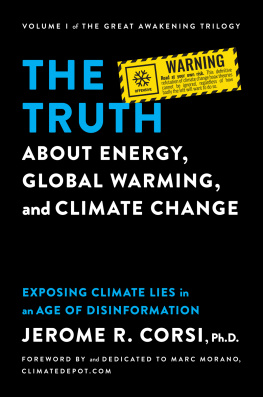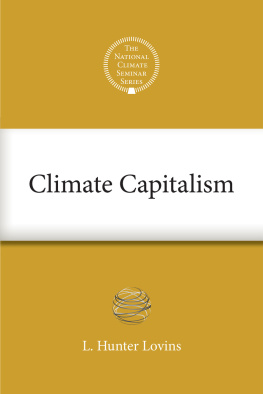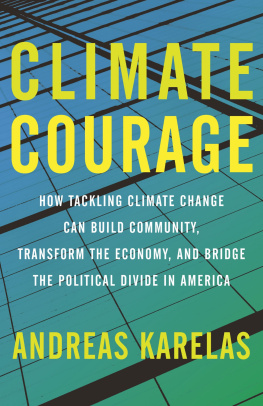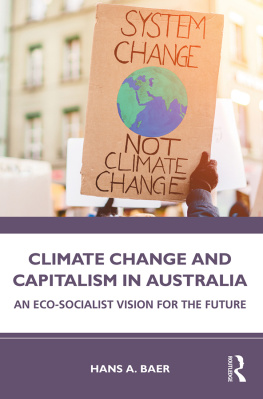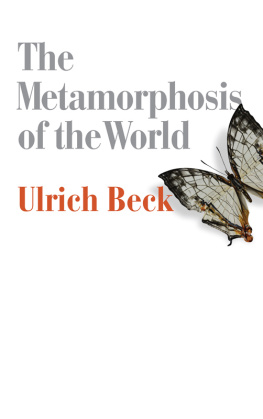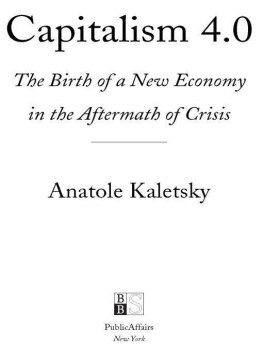The Case for Climate Capitalism
Economic Solutions for a Planet in Crisis
TOM RAND

Contents
For Rupert, of course, with love unbounded.
And for the brave Greta Thunberg:
Adults keep saying, We owe it to the young people to give them hope. But I dont want your hope. I dont want you to be hopeful. I want you to panic.
I want you to feel the fear I feel every day. And then I want you to act.
I want you to act as you would in a crisis. I want you to act as if our house is on fire. Because it is.
Speaking at the World Economic Forum in Davos, Switzerland, 2019
Man achieves civilization not as a result of superior biological endowment or geographical environment, but as a response to a challenge in a situation of special difficulty which rouses him to make a hitherto unprecedented effort.
Arnold Toynbee
Partway through writing this book, I discovered I was going to become a father. His mother and I were both surprised as it proved wrong a cadre of medical experts. The usual panic ensued and faded. It was obvious my life would change in lots of ways, many unexpected, mostly good, some inconvenient. But I knew I would handle it; after all, the same things happened to billions of others for thousands of years! Its part of being human. But one deep-seated fear simply wont go away. It may not be something I can ever handle with grace. Its partly why this kid thing hadnt already happened.
Climate change terrifies me. Jokes about apocalyptic landscapes are as much confession as humor to climate nerds. Its not just me anyone whos been in the carbon kitchen comes out in an uncomfortable emotional state. Each person deals with those demons in his or her own way. Eric Holthaus a meteorologist and former columnist for the Wall Street Journal who writes about the impacts of global climate change came out publicly about the way his work affected his mental health. Hes not the only one. By drawing attention to his own struggles, he normalized a conversation many of us want to have.
Whats that got to do with the kid? The prospect of hitting catastrophic tipping points in the next few decades brings more than sleepless nights it makes having a kid a complex moral question. as an environmental one. Having kids is no longer morally benign or even good as it was in previous generations. But for me, its not just the population thing. After all, someones got to have them, and heck, Im only having one!
My deep unease is because I know absent a near-miraculous change in political will my kid is likely to grow up in an age driven by scarcity and conflict. I cant forget what Ive learned about climate risk. There are good reasons most sane people tune out increasingly shrill warnings from the scientific and security communities. They are deeply unsettling, even anxiety-inducing.
One way Ive been keeping my own climate demons at bay was to believe I was one step removed from that possible future. Im connected by love to an extended network of friends and family, of course, but with no kids of my own, I could fool myself into seeing climate risk as a philosophical problem or interesting anthropological challenge rather than a direct emotional threat. Id live to see some effects, but by the time things got catastrophic say 2040 or 2050 Id be long gone with no real stakes in play. No more. My kid will be an adult then. Without some sharp turns in our economic system, hell almost certainly see some degree of breakdown in social order. So now Im in way deeper than Id planned, and its uncomfortable. Those demons have come back with a vengeance.
Days after discovering I was to be a dad, I attended the 2016 Planetary Security Conference in The Hague. Military brass and security experts, one after another, confirmed what I already knew: the degree of social upheaval coming our way is mind-numbing. The language they used was somber: substantial risks of societal collapse; catastrophic effects; destabilization. That very year, every refugee hitting European shores came from water-stressed countries. The Syrian war was exacerbated by the longest and most severe drought in memory. The razor-wire fence around Bangladesh, backed by shoot-to-kill soldiers, is a dark premonition of what will happen when that crowded country begins to flood and the population looks to escape. When Russia temporarily shut down grain exports during a severe drought in 2012, the cost of food around the world skyrocketed. The resulting riots kicked off the Arab Spring.
The military community doesnt see climate change as a simple set of individuated physical events, like droughts or storms, but as a threat multiplier that amplifies social tensions in ways we are just beginning to appreciate. Water stress in one place brings risk elsewhere: those Syrian refugees triggered a resurgence of the far right throughout Europe. And food markets are global; leaders cannot see their populations starve without resorting to what military might they have to get the food and water they need. Refugees by the tens or even hundreds of millions will not be contained in camps or by walls. Political tensions build in complex, interactive ways. We do not live in isolation. Our individual security is predicated on collective security. My kid cant hide, even in a place like Canada.
Were seeing now in the U.S. what can happen when people get nervous. Populist demagogues who play to those fears find room to breathe. Instead of banding together, walls both real and metaphoric go up. If people are nervous now because of recent mild shocks to accepted norms of economic progress, theyll be terrified later. And, of course, a climate denier currently occupies the highest office on the planet. Things can go the other way. People in times of stress often come together and elect leaders of compassion and vision. But Trumps win and early actions as president show thats hardly a given. Most alarming is democracys massive overreaction to relatively tiny levels of personal insecurity compared to whats coming. That reasoned debate and the rule of law in the United States are under threat today bodes ill for my kid and his peers.
My kid arrived just as the storms gather intensity. It was a hard week in The Hague. And a difficult year. It was tempting and perfectly rational to look the other way, to hibernate in a home filled with love, to leave the worry to others. But I cant look the other way. I cant give up. If for no other reason, I want that kid to know I tried.
We cant solve climate change, but we can still head off the worst. Thats my lifes work now more than ever. Ive no choice but to dig deeper for solutions. This book is one of my shovels. So is my clean energy technology fund, ArcTern Ventures. So, too, are my weekly debates on CBC News Network and elsewhere with right-wing libertarians who cant yet acknowledge that we should even try to combat the coming storm. Whatever happens, that kid will know I did my best. I wont choose the luxury of looking the other way, of getting lost in domestic life.
Climate change will, more than anything else, define the economic and social conditions of my kids generation. Thats true for Canadians, Pakistanis, and Africans. It holds for rich and poor, men and women, artists and venture capitalists. This is true whether or not we limit warming to relatively safe levels. To mitigate climate risk means decades of radical change to the economy, change we have not yet begun in earnest. Absent that effort, we face centuries of economic uncertainty and social unrest. We either make the kind of change that rights the ship as best we can, or we live with disruptive, dislocating, and damaging changes to the economy and planet. Either way, climate now dominates economic and social life. Some form of Climate Capitalism is inevitable.
Next page
